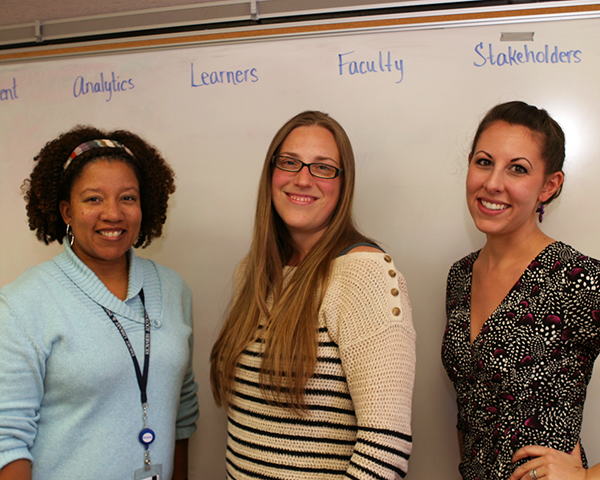
Last month, LEAF and LITS Human Resources held their first 2014-2015 meeting of the Professional Reading Series, entitled “MOOCs: Supersizing Education.” The event was an open discussion about MOOCs (Massive Online Open Courses) that have been trending in universities worldwide and how these types of classes impact education.
Facilitated by Stephanie Parisi (Coursera Instructional Designer, Faculty Services) and Dana Bryant, PhD (Lead Instructional Technologist, Faculty Services), and hosted by Courtney Chartier (Head of Research Services, MARBL), the focus was on issues MOOC-offering universities face and how finding creative solutions to those issues can improve MOOC education for all learners and contribute to best practices in the field.
Participants were instructed to read the article “MOOCS: Digesting the Facts” by J. Baggaley (an article comparing MOOCs to the fast food industry), and watch the TED Talk “Why Massive Open Online Courses (Still) Matter” by Anant Agarwal (where Agarwal discusses the long-term implications of MOOCs).
“There are opposing viewpoints about MOOCs,” said Parisi, “and we never get a chance to have these open discussions.” Participants discussed whether or not MOOCs are dispensing “junk education” and questioned if universities and faculty are using MOOCs for altruistic means or merely to market their own publications and offerings.
There was much discussion about Emory’s perceived goals for partnering with Coursera. MOOCs serve different purposes depending on the institution providing them and many felt that Emory MOOCs are showcasing a variety of offerings to market the university and attract people to the physical campus as potential future students.
Various members of the discussion had taken MOOCs themselves and related their experiences. Gabrielle Dudley (MARBL) pointed out that the forums are overwhelming due to massive participation but can also be a place for ultra-motivated learners to gain more knowledge through helping others.
The Coursera Team mentioned that they are working on an upcoming MOOC on Ebola and the group agreed that Emory has a rare opportunity to use recent notoriety in this area to help others. “If there is a true altruistic motivation, that ends up altering the content we deliver,” said Timothy Harfield (Faculty Services). “Customizing the content can make a difference.”
“This was a wonderful event that generated a rich discussion,” added Parisi. She went on to conclude, “As the instructional designer for these courses, a critical point I’m always thinking of is what implications do these courses have on teaching and learning at Emory? My team benefited immensely from the intelligent conversations happening around the table, and now we can take the thoughts shared by the LITS community and put them into action when we are working on our MOOCs.”
For a retrospective of Emory’s 2014 Coursera offerings, check out the video below:
[jwplayer mediaid=”8002″]

Leave a Reply